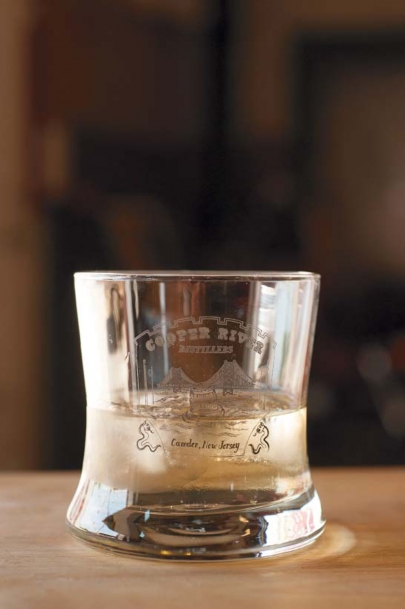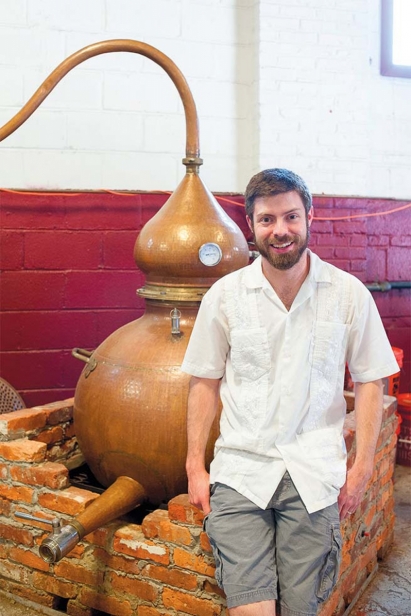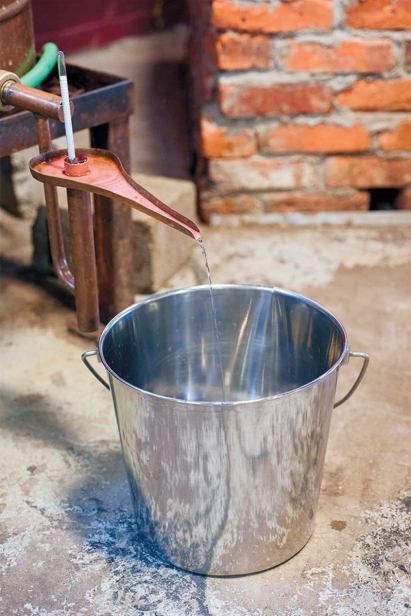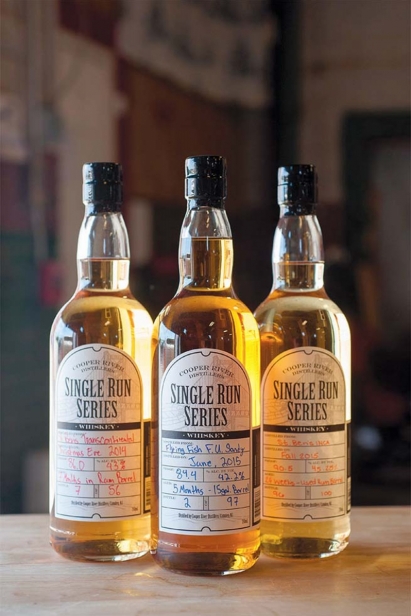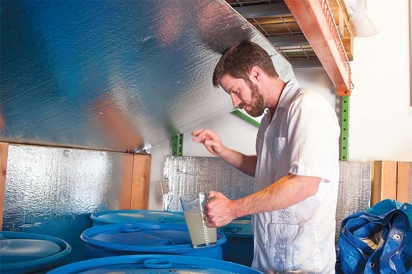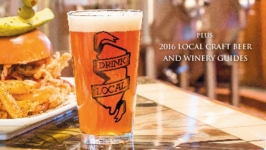Cooper River Distillers Turns Castoffs Into Signature Spirits
Drinks: Three Cheers for Recycling
Interesting things are happening with New Jersey’s locally produced spirits, beers and wines at Cooper River Distillers. Owner James Yoakum and his small crew of distillers in Camden are working with regional breweries and wineries to distill one-of-a-kind single batch whiskies and locally produced brandy—saving beer and wine that might otherwise go to waste.
Yoakum calls it “salvaging.”
Turning Beer into Whiskey
Craft breweries pride themselves on producing excellent beers that reflect a certain style and taste profile. When a batch of beer is off somehow—maybe it doesn’t have the intended balance of flavors or aroma—the brewer isn’t willing to put it out there with the brewery’s name on it. Often, that beer gets dumped down the drain in accordance with local laws. At that point, all the resources that went into that beer—ingredients, water, time and effort—go down the drain with it.
But there is a clever and creative way to avoid that kind of waste. Cooper River Distillers comes to the rescue and saves the beer by distilling it, aging it in barrels and creating a batch of Single Run Whiskey.
“The idea to distill beer into whiskey is a pretty obvious one,” says Yoakum. “The actual packaging up of these products and selling them is a bit rarer maybe, mostly because they require a lot of customer education if you really want people to understand what they’re drinking or tasting.”
Fortunately, the distillers at Cooper River like talking to their customers—and teaching people that “their whiskey was distilled from ready-to-drink beer” is more fun than work for them.
The first Single Run Whiskey batch came about because Tim Patton, from Saint Benjamin’s Brewing Company in Philadelphia’s Kensington neighborhood, knew that Yoakum liked experimenting. When Patton had some beer he needed to get rid of, he offered it up as Cooper River’s inaugural salvage experiment.
“When we first opened, we used equipment that we cobbled together,” says Patton. “We ended up scorching some of our beer and the flavors weren’t really what we intended.” The brew had a distinctly charred quality that Patton didn’t like.
The first scorched beer Patton donated was Liaison Saison, a beer with a lavender finish that had been aged for 79 days with applewood chips. The experimenting began, and Patton wondered if Yoakum could get those less-than-pleasant burnt and smoky smells to go away or mellow.
He suspected such a transformation was likely. “A major flaw in a beer could be good in whiskey,” says Patton. In the end, the Liaison Saison whiskey was appealing enough to be bottled and sold. That batch yielded only 17 bottles of the whiskey, which Patton says was a polarizing spirit: People loved it or hated it.
“I really liked that whiskey,” says Patton. “I thought a lot of nice notes from the Liaison came through, including the lavender. It made the whiskey more akin to a barrel-aged gin than what we would call whiskey.”
Whiskey that tastes like gin is unusual, a real curiosity, and that’s just what Yoakum was going for.
“If we can turn the beer into something tasty, we can turn it into something interesting,” he says. So far, the distillery has released seven different whiskeys in its Single Run Series. These very small, limited release whiskeys have become sought-after spirits, ranging from $45 to $70. The first six batches sold out fast.
These experiments are a big commitment for Cooper River Distillers and its sole still. To distill a batch of the Single Run Series, they have to take a couple of days off from distilling their regular products, like Petty’s Island Rum and Cooper River Rye Whiskey. If a salvage project doesn’t turn out well, that time and labor are lost—and these unloved liquids don’t always become something you’d want to drink.
“We have had to dump a couple batches that didn’t turn out the way we hoped,” says Yoakum, “but for the most part, we’ve gotten stuff we’ve been proud of.”
Another brewery that has handed off beer to be distilled into whiskey is Flying Fish. When a distributor found eight kegs of Flying Fish’s F.U. Sandy buried in a warehouse, the beer made its way to Cooper River Distillers. “The beer was about a year old and way past its sell-by date. When distilled, the hop character came through so clearly,” says Gene Muller, founder of Flying Fish in Somerdale. “It’s interesting to take something that could have been waste and distill it, blurring the edges between beer and whiskey.”
The beer was aged for five months in a used 17-gallon whiskey barrel that yielded 97 bottles. The finished whiskey was flavorful, complex and uplifting. In a full-circle collaboration, the distillery gave the whiskey barrel that aged the beer back to Flying Fish. The brewery is now aging Farmhouse Summer Ale in it.
Muller likes the upcycling effect of the collaboration. “By maximizing the value of the ingredients, it’s like making art from found objects,” he says. “There’s a higher value in taking the beer and distilling it. If it hadn’t been distilled, it would have been mixed with animal feed, which is just one step above putting it landfills.”
Turning Wine into Brandy
When a winery deems a batch of wine unsellable to consumers, there are two common solutions: Sell it to a vinegar plant or to a distillery for brandy. It cannot legally be dumped down the drain in New Jersey, because the acidity in the wine can make a mess of the pH and the biologics in the sewer system, potentially killing off beneficial bacteria.
When Unionville Vineyards in Ringoes found atypical aging (ATA) in an already bottled pinot grigio, winemaker Cameron Stark was faced with deciding what to do with it. ATA is a problem in bottled white wine because it ages the wine so quickly that by the time it’s ready to be sold, it’s undrinkable.
“Distillers are much happier to get small batches of wine than the vinegar companies,” says Stark. He decided to donate roughly 300 cases of bottled New Jersey pinot grigio to Cooper River Distillers.
“We had to manually open each bottle and pour it into a vat. It was a very sad day,” says Stark. The bottles, corks and cardboard were recycled. The wine made a trip to Camden and the distillers got to work making brandy and deciding how to age it. In the end, Yoakum and his crew chose to age it in three of their barrels: a used Rye Oak Reserve Rum barrel; a used One-Year Anniversary barrel; and an unused barrel.
The brandy will age for a little over a year, and Yoakum is still deciding the exact blend from the three barrels that will end up in the bottled brandy. It will be sold under the name “Copper and Vine,” probably sometime this summer.
A 100-Percent New Jersey Grape-Based Port
Cooper River is working with Bellview Winery in Landisville on a different type of brandy project. It’s not meant to salvage undrinkable wine, but it is equally interesting and good for New Jersey’s wine industry. It’s an effort to create a port made solely with grapes from the winery’s own vineyards. The best port wine is fortified with brandy. Since the state’s wineries cannot make their own brandy, many of them buy commercial “neutral grape spirits,” not brandy, to fortify their port.
Up until recently, Bellview was one of those wineries. Then the winemakers decided to work with the distillery to have their own grapes turned into brandy to fortify Bellview’s own port.
“We weren’t overly impressed with the quality of the grape spirit,” says David Gardner, winemaker at Bellview. “They call it neutral, and it is. The stuff we got from Cooper River is fruitier, with more flavor to it.”
“Now we’ll be able to say it’s our own grapes and the port is all from New Jersey,” he says. “We’re not allowed to put that on the label, but we can obviously tell people that our port is made with our own brandy.”
Bellview’s first port made completely with grapes from its own vineyards is still aging. Made from the 2015 vintage, the brandy is distilled from Cayuga grapes and mixed with Chambourcin wine. They will age together in old wine barrels for three years. The final product will most likely be bottled in late summer 2018 and sold in time for the holidays.
Collaboration Means Cross-Promotion
The benefits of these collaborations go beyond salvaging beer and wine or creating a truly local port.
When Flying Fish sells the Farmhouse Summer Ale that was aged in the barrels that turned its distilled F.U. Sandy into whiskey, its brewers will have a story to tell in their Somerdale tasting room. That story will certainly mention Cooper River Distillers, and visitors to the brewery will find out about the one-room distiller in Camden housed in an old mechanic’s garage.
When Cooper River sells the single-run batch it’s currently working on, distilled from beer from the first batch of beer received from Departed Soles Brewing Company, people will learn about the tiny one-man brewery that opened in downtown Jersey City about a year ago.
These projects are a practical, tasty way for the state’s small spirits, beer and wine producers to support and promote each other.
What’s Next?
Cooper River Distillers will continue to keep the creativity flowing with beer and wine that need salvaging. Yoakum says he would also love to do events where a brewery’s beer is paired side by side with the whiskey that was distilled from a subpar batch of that beer. He’d also like to do more brandy, even creating a consistent product if he can source enough New Jersey wine.
The best way to know what the distillery is up to next is to visit. Cooper River throws open the garage door on Friday nights and Saturday afternoons, giving tours and serving cocktails from the small bar in the middle of the one-room distillery. For specifics, visit cooperriverdistillers.com or like Cooper River’s Facebook page.
Cooper River Distillers
34 N. 4th St., Camden
856.295.1273
cooperriverdistillers.com


